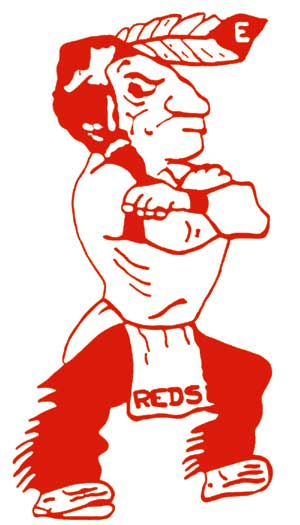
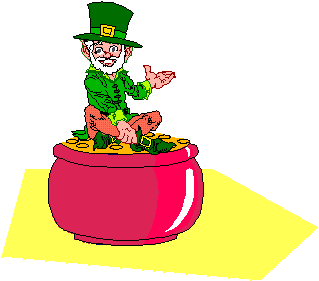 Another response to Fighting Sioux vs. Fighting Irish:
Another response to Fighting Sioux vs. Fighting Irish:

 Another response to Fighting Sioux vs. Fighting Irish:
Another response to Fighting Sioux vs. Fighting Irish:
I have just concluded reading your page regarding your correspondence with another gentleman regarding the mascot issue, and the comparisons between Indian mascots and the Fighting Irish.
I first want to whole-heartedly agree with you that one group's acceptance of a mascot does not constitute a basis that all other groups should accept what they see as derogatory images of their people or culture.
I am Irish, and like many others, do not object to the Fighting Irish. My acceptance is due to the fact that we (Irish & Catholics) chose the image and name ourselves, and turned it into a (mostly) positive issue.
However, I believe that there are several points which should not be dismissed.
First, the Fighting Irishman is not a really a leprechaun. It was adapted from a newspaper cartoonist's depiction of a drunken, bellicose Irishman. Therefore, I feel that "Fighting Irish" is essentially "Drunken Irish." In addition, many Irish are called leprechauns when being mocked. Although you may not have been subjected to this viewpoint, I have been numerous times. The character's outdated clothing is a derogatory depiction of the poverty-stricken Irish immigrants "putting on airs," but not knowing that the way they did it is open to ridicule.
You are correct in pointing out Tip & JFK as symbols of the power structure within the Irish community, but I can also point out that JFK barely won his election, and much of the campaigning against him was openly anti-Catholic. Phrases such as "I don't want the Pope in the Oval Office" were common. However, Ronald Reagan was Protestant and considered himself "Scotch Irish." That is, until he realized that he could get some pull in the Irish community by becoming more Irish. I'm surprised he didn't have commercials featuring "Oh Danny Boy" in the background.
The Irish were treated as poorly by the English as Native North Americans were by settlers & the American government. This did not happen over a short time period (I believe you point to a 70 odd year time period) but has been going on since the 1200's and is still happening today. This point was moot, as any oppression is unacceptable, but you brought up the numbers game, so 800+ trumps 500+. The laws known as "Penal laws" were in place in Ireland and were much the same as the atrocities committed on Native North Americans. The area known as Muenster was essentially depopulated by the English, with most of the people hanged or burned alive in their hovels during a war against an Irish earl. Northern Ireland is not just a small sector still ruled by the British. I doubt that if a reservation's government were taken over by the US government, Native Americans would consider it a small matter.
There were also many anti-Irish and anti-Catholic laws still on American books, even after laws concerning race were repealed. The "Know Nothings" were a political party with one of their main platforms being anti-Catholic. These laws and attitudes were common at the beginning of the last century.
And yes, Irish people are still discriminated against. The often-used argument that we can't be told apart from other "whites" is without merit. There are several physical attributes which many Irish share, which are well known by racists who wish to practice bigotry against Irish Catholics. Also, the fact that many Irish names begin with a "Mc" or "O'" can also lead to identification of our ethnic group and discrimination. We are known as "Black Irish" or "Shanty Irish" where I come from. Most Irish families I know are poor or working class, with my generation being the first to really be able to pursue college educations, whereas most Protestant people I know are from the middle class and white-collar or supervisory section.
I bring up these points only to illustrate that others have experienced, and still are experiencing, atrocities similar to Native Americans. This in no way diminishes the experience of the Native American, nor does it make any abuse of them right. However, to dismiss the sufferings of a people that has gone on so long in order to try to make a point about the sufferings of another serves no true purpose. It can only cause a potential ally to turn into an adversary.
Finally, let my repeat my support of one of your views. My and many of my fellow Irish peoples' acceptance of the Fighting Irish mascot in no way implies that Native Americans should be forced to support a mascot that they deem as racist.
Thank you for your time,
Matthew McGovern
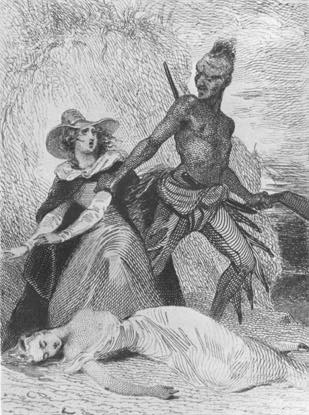
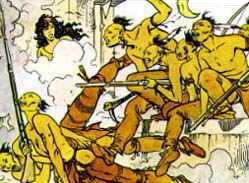
Rob's reply
>> My acceptance is due to the fact that we (Irish & Catholics) chose the image and name ourselves, and turned it into a (mostly) positive issue. <<
Which is the crux of the issue, of course. The Irish chose the "Fighting Irish" nickname to represent (i.e., stereotype) themselves. Except in the case of Indian colleges and high schools, Indians didn't have that choice.
>> First, the Fighting Irishman is not a really a leprechaun. <<
Yes, but Notre Dame chose the leprechaun as its mascot. It's an additional issue beyond the "Fighting Irish" name. It's relevant when comparing mascot to mascot: a real live Indian vs. a nonexistent fictional character.
>> In addition, many Irish are called leprechauns when being mocked. Although you may not have been subjected to this viewpoint, I have been numerous times. <<
I've never seen this aspersion in my voluminous perusal of the media. But if you say it exists and it bothers you, then protest it. Don't let yourself be mocked as a little sprite-like person.
>> You are correct in pointing out Tip & JFK as symbols of the power structure within the Irish community, but I can also point out that JFK barely won his election <<
Nixon was an experienced politicianóa former vice presidentócompared to JFK. I guess you think JFK would've won in a landslide except for the prejudice against himóbut who knows?
In any case, JFK wonówhich pretty much signals the final acceptance of Irish people. You can't get much more approval than a majority of American votes. That's more than any Indian has ever gotten.
>> much of the campaigning against him was openly anti-Catholic. <<
Anti-Catholic isn't anti-Irish. Nothing about the "Fighting Irish" name or the leprechaun mascot suggests a mockery of Catholicism.
>> However, Ronald Reagan was Protestant and considered himself "Scotch Irish." <<
Lots of Irish are Protestants. That's probably how they joined the mainstream so easily.
>> The Irish were treated as poorly by the English as Native North Americans were by settlers & the American government. <<
Maybe, but did they experience a 90-95% reduction in their population? No.
>> This did not happen over a short time period (I believe you point to a 70 odd year time period) <<
Yes. I was referring to the period between the Great Famine and the integration of the Irish into the American mainstream. And I was referring to the periods when the Irish and the Indians were subject to genocidal policies, not merely harsh or repressive policies. The genocide against Indians began soon after Columbus arrived in the Americas.
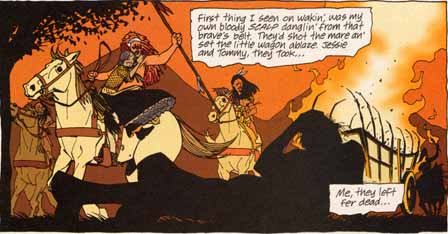
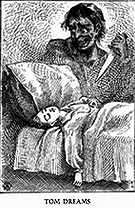
800-plus trumps 500-plus?
>> This point was moot, as any oppression is unacceptable, but you brought up the numbers game, so 800+ trumps 500+. <<
It does if you can prove that genocidal actions similar to those against the Indians occurred 800+ years ago.
But I'm not sure you get to count problems from another continentói.e., another life. If you could, blacks could claim they were persecuted by other Africans or Arabs for at least 1,000 years. Indians could claim they were persecuted by other Indian tribes for thousands of years before Columbus, or even by their Siberian forbearers for tens of thousands of years before crossing the Bering Strait.
You see my point? When the Irish fled the Great Famine and came to America, they started afresh. The American establishment may have persecuted them, but it wasn't with the same laws and policies as the English establishment did.
Only a couple of generations of Irish-Americans could claim they experienced oppression in England. Each new American generation experienced only American oppression, not English oppression. The effects of this oppression went back only a couple of generations or so, not 800 years.
In contrast, Indians experienced an unbroken line of Euro-American oppression stretching back 500 years. For them there was no break in continuity, no fresh start. That's the point I'm making when we discuss the time difference.
>> There were also many anti-Irish and anti-Catholic laws still on American books, even after laws concerning race were repealed. <<
Indians weren't considered full citizens with the right to vote until 1924. The Irish had the right to vote soon after they arrived on American shores. I'm not sure when they were allowed to serve on juries or run for office, but it was undoubtedly before Indians were allowed.
>> The "Know Nothings" were a political party with one of their main platforms being anti-Catholic. <<
But was their platform anti-Irish? And that was in the mid-1800s, hundreds of years after the Indians began experiencing oppression.
>> These laws and attitudes were common at the beginning of the last century. <<
Indians experienced the same kind of laws and attitudes for much longer.
>> And yes, Irish people are still discriminated against. <<
Are they? I haven't seen one iota of that in the media. Give me some examples of real discrimination against the Irish, not just media stereotyping.
>> Most Irish families I know are poor or working class, with my generation being the first to really be able to pursue college educations, whereas most Protestant people I know are from the middle class and white-collar or supervisory section. <<
A generation ago is around 1980, you know. You mean there was widespread discrimination against the Irish during "Dutch" Reagan's presidency, such that most Irish were kept out of college? I doubt it.
>> I bring up these points only to illustrate that others have experienced, and still are experiencing, atrocities similar to Native Americans. <<
I'll gladly concede that. I discuss general racism against minorities in Highlights of the US Report to the UN on Racism.
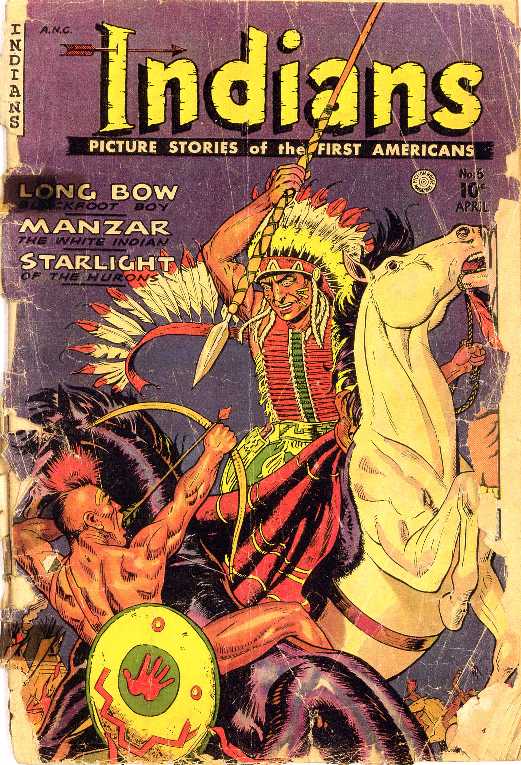
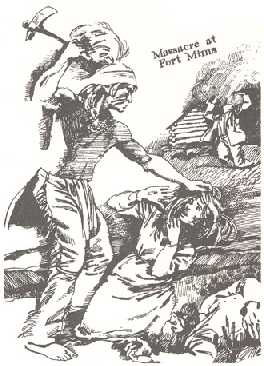
Comparison serves no purpose?
>> However, to dismiss the sufferings of a people that has gone on so long in order to try to make a point about the sufferings of another serves no true purpose. <<
Wrong. It serves a very clear purpose. The whole point of these postings is to rebut those who say, "The Irish have suffered just as much as Indians, but you don't see them complaining about their 'Fighting' nickname." You can't touch this point unless you argue that Indians have suffered worse than the Irish in America.
Most people don't make that point, so I generally don't bring it up in my counterarguments. That's why I didn't compare Indian and Irish suffering on my main page. I really bring it up only when someone wants to maximize the Irish's suffering, because then it becomes relevant.
Let's recall what we're discussing here: the difference between "Fighting Irish" and "Fighting Sioux." The difference is that Indians have been stereotyped as fighters (i.e., as warriors or savages or killers) a lot longer than the Irish have. Especially if we're talking about in America, which we are. (I don't think English stereotypes of the Irish have any currency in the US.)
If you can prove that Americans have characterized the "fighting" Irish as warriors, savages, and killers for 500+ years, then my argument kind of falls apart. Then the "Fighting Irish" stereotype is as bad as the "Fighting Sioux" stereotype, historically speaking. So yes, I have an excellent reason for disputing the longevity of the problem. It's central to this argument.
>> My and many of my fellow Irish peoples' acceptance of the Fighting Irish mascot in no way implies that Native Americans should be forced to support a mascot that they deem as racist. <<
I agree with that!
Related links
Genocide by any other name...
|
. . . |

|
All material © copyright its original owners, except where noted.
Original text and pictures © copyright 2007 by Robert Schmidt.
Copyrighted material is posted under the Fair Use provision of the Copyright Act,
which allows copying for nonprofit educational uses including criticism and commentary.
Comments sent to the publisher become the property of Blue Corn Comics
and may be used in other postings without permission.